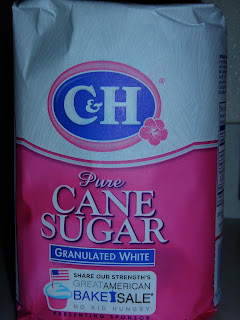A friend asked me this question today. It's easier to understand in the context of what sugar is, and how it affects our body and digestion.
What is sugar?
First of all, when we talk about sugar, what exactly are we talking about? Sugar comes in lots of forms, such as milk sugar (lactose), but generally, when we talked about sugar, we're referring to refined table sugar. Sugar comes from sugar cane or sugar beets. When in their whole form, these have things like fiber, vitamins, and minerals. Refining sugar is the process of boiling it down, removing the solids and color, until all that's left is sweet tasting little sugar crystals. So, problem number one is that we remove all the "good stuff." One rule I try to follow is to eat food in its natural state as much as possible.
Enzymes and Digestion
One of the good things we remove from refined sugar is enzymes. Dr. Edward Howell, a food enzyme researcher says this:
"If enzymes were in the food we eat, they would do some or even a considerable part of the work of digestion by themselves. However, when you eat cooked, enzyme-free food, this forces the body itself to make the enzymes needed for digestion. This depletes the body's limited enzyme capacity." (Click here for the complete interview)
So what does that mean? Basically, when we eat refined sugar we aren't eating any of the components of food that help digest it. Our bodies CAN digest refined food, but since the food is enzyme free, the body must rely on our limited stores of enzymes to do the job.
Blood Sugar and Insulin
Next, we come to the topic of blood sugar. While blood sugar goes up and down, our body's job is to try to keep our blood sugar from spiking too high or too low. There are many processes in our body that are dedicated to doing just that.
"But", says Sally Fallon, "when we consume refined carbohydrates, especially alone, without fats or proteins, they enter the bloodstream in a rush, causing a sudden increase in blood sugar. The body's regulation mechanism kicks into high gear, flooding the bloodstream with insulin and other hormones to bring blood sugar down to acceptable levels. Repeated onslaughts of sugar will eventually disrupt this finely tuned process, causing some elements to remain in a constant state of activity and others to become worn out and inadequate to do the job. The situation is exacerbated by the fact that a diet high in refined carbohydrates will also be deficient in vitamins, minerals and enzymes, those bodybuilding elements that keep the glands and organs in good repair. When the endocrine system thus becomes disturbed, numerous other pathological conditions soon manifest--degenerative disease, allergies, obesity, alcoholism, drug addiction, depression, learning disabilities and behavioral problems."
Here's a clip from the movie Fat Head that gives you a visual on how this all works.
You may come to the conclusion that refined sugar is evil and you should avoid it at all costs. If you have the willpower to do that, it probably is better for your health. But for our family, sugar is a sometimes food.
Ways to cut down on sugar
1. Avoid packaged foods. Or, at the very least, read the labels. Sugar has many names in the ingredient list: high fructose corn syrup, dextrose, maltose, lactose, evaporated cane juice, and many more. SO many packaged foods have high fructose corn syrup. Start by avoiding that one, as it is definitely a processed, refined sugar and in so many foods.
2. Start slowly to cut the sugar down. If you're used to using 2 Tablespoons of sugar on your oatmeal, try cutting it in half. If only one Tablespoon seems too little, try 1 1/2 Tablespoons. It won't take too long to get used to it, and then in the future you can cut back a little more. If you do it slowly, you won't even miss it.
3. Ask yourself if you really need to add sugar. A few recipes I have really don't- like the 2 Tbsp. called for in my pancake recipe or the recipe for wheat bread that calls for brown sugar.
4. In baking, reduce the sugar by about half. You may have to play around with certain recipes, and reduce more or leave more in, but I find that half is usually a good place to start in most baked goods.
5. Use extra virgin coconut oil in place of butter. Extra virgin coconut oil has a sweet flavor, so you won't need as much added sweetener.
6. Try using a sugar that is less refined: raw honey and pure maple syrup are good ones to try. They are both sugars, but still have nutrients that our bodies can use.
So, what is so bad about sugar? Probably the worst thing about it is its prevalence in our food. Try one of the above tips or one of your own to cut back on the sugar in your diet.
Monday, January 25, 2010
Subscribe to:
Post Comments (Atom)





This is the one I am trying to work on. It is hard because I love sweet things! I literally refused 4 different treats passed out in church yesterday. Gah! What are they trying to do to me!
ReplyDeleteGood thing I love dates. Please don't tell me they are bad.